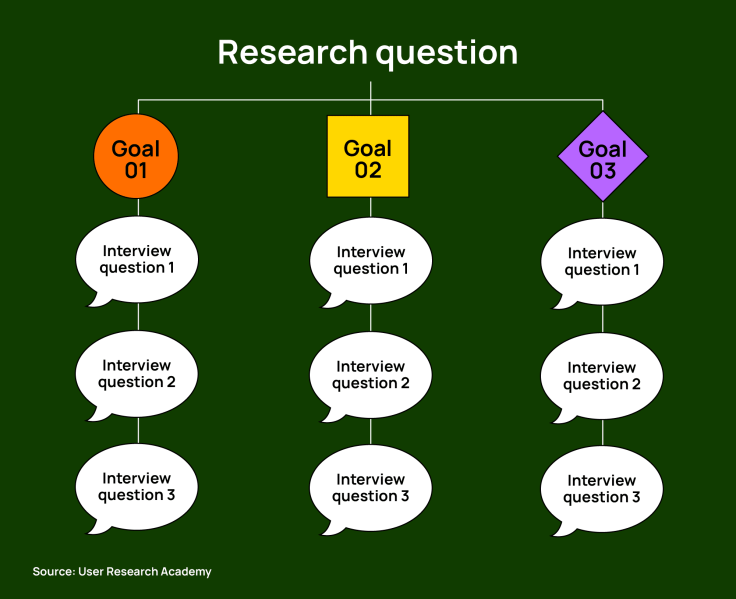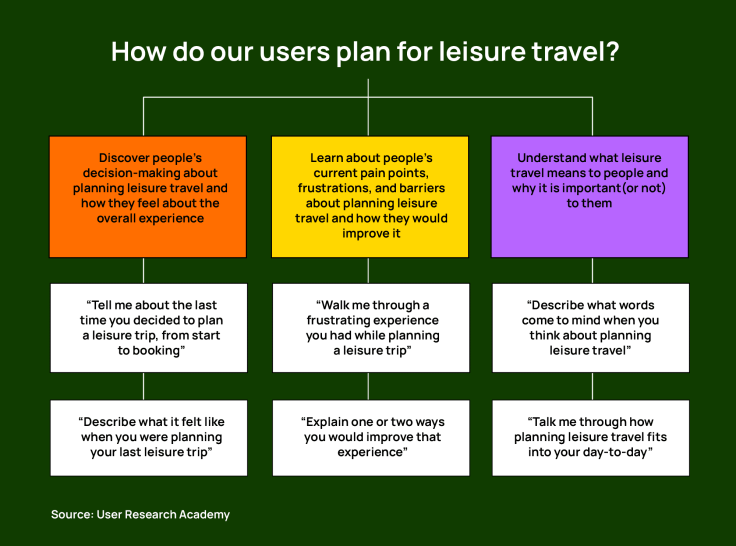How to write an unbiased and conversation-starting discussion guide

Writing discussion guides for my one-on-one interview sessions used to terrify me. Would I sound like a robot? Would the participant feel like they were in a police interrogation? Would I ask too many questions? Too few? And, most scary, would I bias, lead, or confuse the participant?
With all those questions spinning through my mind, it was challenging for me to write my discussion guides. And, because of that, my questions felt stunted and forced. As a result, I often struggled to go deep with participants and have them open up during these sessions.
And then I met TED(W)—who got the How I Met Your Mother reference?
TEDW is an acronym I use to create open-ended, unbiased questions that get participants to tell you stories about their past experiences. Because, when it comes down to it, we do qualitative user research to get these stories. Stories turn into insights that turn into highly actionable recommendations that can help your teams make better, user-centric decisions.
So, how do we use TEDW to write the best interview questions? First, we have to plan for success!
Start with your question and goals
If you know me, I am (annoyingly) strict about beginning projects with valid and answerable research questions and goals. I always begin this way because I have learned it is imperative to the success of a project. If you don't have a clear research question and goals, you will have difficulty creating discussion questions that make sense to you, your stakeholders, and the participant. Without a solid research question and goals, you can find yourself all over the place, with little focus, in your interviews.
How to write a good research question
A good research question is:
Centered around understanding or discovering something about people (not your product)
A problem/idea we don't fully understand
A concept or idea we need more information on to move forward
Often, I get asked to answer questions like:
“Do users prefer this or that design?”
“Do people like the product/feature/idea?”
“Can users use the product/feature/idea?”
“Would people use the product/feature/idea?”
“Do people find value in the product/feature/idea?”
“What do users want?" / "Do users want this product/feature/idea?”
“Is this product/feature/idea (good) enough for users?”
I’m sorry in advance, but these questions aren’t answerable by qualitative research! These are impossible to answer between the small sample size of qualitative research and future-based questions. So if you get questions like this, you can instead propose:
“Do users prefer this or that design?” -> A/B testing
“Do people like the app?” -> look at usability/satisfaction
“Can users use the app?” -> “How do users interact with the app?”
“Would people use the feature?” -> “Have people used something similar before, and what was their experience like?”
“What do users want?” / “Do users want this product/feature/idea?” -> Focus on top pain points through a survey and solve those
“Is this product/feature/idea (good) enough for users?” -> look at usability/satisfaction
“Do people find value in the product?” -> market research, value prop brainstorming, or product-market fit
So, how do we write a good research question? Valid research questions for qualitative research:
Start with “how” or “why”
Are about processes, mental models, journeys, and perceived feelings/impact
Focus on the past rather than the future
Think about the questions you have and what you are trying to learn, and ensure it is something you can answer with qualitative research. And then, you can use the following formulas to create a valid research question:
How do users [think about/make decisions on/interact with] [subject of research/product]?
How do users perceive [process/event/concept]?
How do users perceive and report the impact of [process/event/concept]?
Here’s an example of a previous research question I’ve asked before:
How do our users plan for leisure travel?
How to write research goals
The next step is writing research goals based on your initial question. Research goals are specific ideas or areas you want to learn more about during the research/the questions you want to answer. They break the larger research question into smaller, answerable parts. You might find them slightly repetitive of the initial question, so you’re doing it right if that's the case!
These goals help you focus your interviews and get the most pertinent information from participants. Luckily, there are five overarching research goals:
Discover people’s current processes/decision-making about [research subject], and how they feel about the overall experience
Learn about people’s current pain points, frustrations, and barriers about [current process/current tools] and how they would improve it
Uncover the current tools people use to [achieve goal] and their experience with those tools. Also, uncover how they would improve those tools.
Understand what [research subject] means to people (how they define it) and why it is important to them
Evaluate how people are using a [product/website/app/ service] OR Evaluate how people are currently interacting with a [product/ website/app/service]
Now, if we think about qualitative research, specifically generative research, three goals, in particular, stand out:
Discover people’s current processes/decision-making about [research subject], and how they feel about the overall experience
Learn about people’s current pain points, frustrations, and barriers about [current process/current tools] and how they would improve it
Understand what [research subject] means to people (how they define it) and why it is important to them
The research findings should ultimately answer the research question and all the goals. By building these goals, I can ensure I ask the right questions and create a path to guide participants down. Often a research question might be a broad topic, so these objectives narrow the scope while allowing for natural conversation and innovation.
Here are some sample goals based on the above research question:
Discover people’s decision-making about planning leisure travel and how they feel about the overall experience
Learn about people’s current pain points, frustrations, and barriers about planning leisure travel and how they would improve it
Understand what leisure travel means to people and why it is important to them
And now, the discussion guide
Hopefully, it will become clear why I harped on research questions and goals earlier on. Each interview question you write should be related to your research goals and question.

So, let's go back to TEDW as a method for writing these questions.
TEDW stands for:
T = "Tell me more about..."
E = “Explain…”
D = “Describe…”
W = "Walk me through...
I spend less time thinking about what to say next with these types of questions. Additionally, the TEDW framework means I am not always asking “why, why, why” repeatedly, but I can still dig deeper into what the user is saying. The TEDW framework is not about asking questions but about having open-ended conversations. Instead of asking people direct questions, you use active listening and open-ended statements to extract the stories from them. Using this technique makes it a lot easier for participants to give you reliable past data, as it reduces biases that come through in research.
To start writing TEDW questions, go back to your question and goals. Write down all the questions you would want to ask to answer each goal.
So taking the example above, it might look like:
Discover people’s decision-making about planning leisure travel and how they feel about the overall experience:
How do people make decisions to plan a leisure trip?
What is the step-by-step process for planning a leisure trip?
How do people feel while planning a leisure trip?
Learn about people’s current pain points, frustrations, and barriers about planning leisure travel and how they would improve it
What are people’s pain points when it comes to planning leisure travel?
What are some frustrating experiences people have had while planning leisure travel?
What did they do when they encountered those experiences?
How did they feel during the experiences?
How would they improve those experiences?
Understand what leisure travel means to people and why it is important to them
What does planning leisure travel mean to people?
How important or unimportant is leisure travel to people?
How does planning leisure travel fit into people's lives?
We then take these questions and turn them into TEDW-based questions:

And you have your discussion guide! I always recommend three to five questions per goal and always write them in priority order, just in case you run out of time.
Using these questions should get participants to share their past experiences with you. And, whenever there is a break in the conversation, you can always go deeper by either asking “why” or using another TEDW phrased question. For example:
Participant: I was frustrated when customer support wouldn’t answer my calls after seeing they changed my flight completely
Interviewer: Explain what you mean by frustrated?
OR
Interview: Talk me through what you did next?
TEDW is a way to start conversations and begin the storytelling process. Once the participant starts giving you nuggets of the story, you can dig deeper into the critical parts based on our research goals. So give it a try in your next project!
Written by Nikki Anderson, User Research Lead & Instructor. Nikki is a User Research Lead and Instructor with over eight years of experience. She has worked in all different sizes of companies, ranging from a tiny start-up called ALICE to large corporation Zalando, and also as a freelancer. During this time, she has led a diverse range of end-to-end research projects across the world, specializing in generative user research. Nikki also owns her own company, User Research Academy, a community and education platform designed to help people get into the field of user research, or learn more about how user research impacts their current role. User Research Academy hosts online classes, content, as well as personalized mentorship opportunities with Nikki. She is extremely passionate about teaching and supporting others throughout their journey in user research. To spread the word of research and help others transition and grow in the field, she writes as a writer at dscout and Dovetail. Outside of the world of user research, you can find Nikki (happily) surrounded by animals, including her dog and two cats, reading on her Kindle, playing old-school video games like Pokemon and World of Warcraft, and writing fiction novels.


